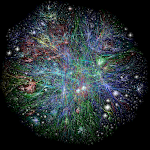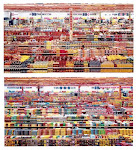Once again, the issue of technology arose; this time, prompted by Néstor’s concerns regarding Richard Berntein’s article “Don’t trust anyone under 30?”, which was published in La Nación under the (maliciously translated?) heading “¿Es possible que Facebook estupidice a los usuarios?” [1] When discussing this article in our L&C blog, the main concern seemed to be whether Facebook users should feel stupid or not. In fact, that was not Berntein’s main concern. In his article, the author rather refers to a recently published book by English professor Mark Bauerlein: “The Dumbest Generation: How the digital age stupefies young Americans and jeopardizes our future (or, Don’t trust anyone under 30)”.
 This cumbersome title carries an almost explicit assertion: “new technologies stupefy.” The first counterargument one may think of is that technologies cannot be blamed for the content they are given. From this point of view, if Facebook is banal this would be because of its users and not because of the technology itself. This answer, however pertinent to a certain extent, seems to be avoiding a crucial idea implicit in Bauerlein’s title. To say that the digital stupefies implies linking stupidity to the digital technology, not as a risk or a potentiality, but as an unavoidable fact. This is the same as saying that technologies carry their own ideology. From this point of view, banality and stupidity would be natural characteristics of the digital gizmos, Facebook and the Internet included.
This cumbersome title carries an almost explicit assertion: “new technologies stupefy.” The first counterargument one may think of is that technologies cannot be blamed for the content they are given. From this point of view, if Facebook is banal this would be because of its users and not because of the technology itself. This answer, however pertinent to a certain extent, seems to be avoiding a crucial idea implicit in Bauerlein’s title. To say that the digital stupefies implies linking stupidity to the digital technology, not as a risk or a potentiality, but as an unavoidable fact. This is the same as saying that technologies carry their own ideology. From this point of view, banality and stupidity would be natural characteristics of the digital gizmos, Facebook and the Internet included.
However counterintuitive this idea of technologies carrying ideology may be, this has been an academic topic of debate for a long time. Langdon Winner (1986) went over this issue in his essay Do artifacts have politics? There, he concluded that different technologies embody different values and power relations that are inherent to them. In his words:
He also quotes Lewis Mumford, who writes that “from late Neolithic times in the Near East, right down to our own day, two technologies have recurrently existed side by side: one authoritarian, the other democratic (…).”
Winner’s and Mumford’s position go beyond saying that technologies can consciously or unconsciously be used or developed in the benefit of a particular ideology. What they are saying is that technologies have their own ideology, and no matter what the intention of the users is, this ideology will persist.
Among the examples posed by Winner, the atomic bomb is the easier to grasp. Developing nuclear technology -anyone would agree- requires of a centralized, rigidly hierarchical and militarized administration. “The internal social system of the bomb must be authoritarian,” writes Winner. And there is no other way such lethal technology could be handled. Nuclear technology, thus, is inherently authoritarian; this is the ideology it possesses.
Going back to Bauerlein’s title, if the ideology of the digital era were banality and stupidity, this would mean that no matter how hard we try to avoid it, the digital technology would always draw us to banality and stupidity. However, paying a quick glance to the content in technologies like the Internet or even Facebook should be enough to notice that there are serious and academic uses given to these two technologies. The Internet is the natural environment of a worldwide network of universities, libraries and research centres. Facebook, on the other hand, grew as a resource for college campuses, to allow students to get to know their new academic communities. If the content in Facebook was originally more banal than the universities sites, this is because Facebook was developed not as an academic tool, but as a community tool for academic support, which is very different.
All this should be proof enough that banality and stupidity cannot seriously be deemed as the ideology of the digital era. But what is the ideology of technologies like Facebook or the Internet then?
 The Internet, it is fair to admit, was born as part of a project for the United States Department of Defense. However, those in charge of developing this technology were academic minds. Thus, although the American government had in mind the control of the quality of military information, it is most probable that those developing the system were really thinking in transmitting and sharing information (which is similar, but quite different). This ideology, coherent with the academic and university contexts that surrounded the development and later perfection of the Internet, may account for its current shape and ideology. This is easy to appreciate. No matter how hard companies try to limit the free transmission of information on the net, no conclusive obstructions can be imposed. People go on finding ways to share information, disregarding of the legal limitations imposed by universal copyrights. The ideology with which the Internet was developed was that of sharing, and in this respect the Internet could be placed within Mumford’s ‘democratic technologies’.
The Internet, it is fair to admit, was born as part of a project for the United States Department of Defense. However, those in charge of developing this technology were academic minds. Thus, although the American government had in mind the control of the quality of military information, it is most probable that those developing the system were really thinking in transmitting and sharing information (which is similar, but quite different). This ideology, coherent with the academic and university contexts that surrounded the development and later perfection of the Internet, may account for its current shape and ideology. This is easy to appreciate. No matter how hard companies try to limit the free transmission of information on the net, no conclusive obstructions can be imposed. People go on finding ways to share information, disregarding of the legal limitations imposed by universal copyrights. The ideology with which the Internet was developed was that of sharing, and in this respect the Internet could be placed within Mumford’s ‘democratic technologies’.
Hackers and virtual communities may serve as an example of this. Castells (2001) mentions these two Internet cultures as part of the four subcultures that helped create and shape the web [2]. Hackers –not to be confused with crackers- are programmers who reject the idea of a restricted copyright for software and freely share their developments on the web. Communities, on the other hand, are groups of people from different fields who simply share their common interests online. And, as Castells reminds us:
The Internet was developed within a democratic, communitarian culture, in which information and free access to it were essential, and this is the ideology the Internet naturally developed. Provocatively, Castells goes on to say that, in the Internet, “the network is the message.”
 Randall Munroe's 2007 Map of the Online Communities (and other places of interest) [click to see full size]
Randall Munroe's 2007 Map of the Online Communities (and other places of interest) [click to see full size]
Being Facebook a community network, its ideology is also democratic. In fact, the ideology underlying most of the digital inventions of our time is, to a certain extent [3], democratic and communitarian. People are the ones who produce, share and control; not the governments, not companies or organisations. But of course, this needn’t be good in itself. A powerful tool in untrained hands could derive in a rustic use of it. And perhaps, this is what Bernstein wonders in his article. After all, he acknowledges:
But he goes on:
These ‘unimportant daily matters’, however, are the same trifles most people share and talk about when they are in private, face to face. But if our private life is banal, we shouldn’t expect technologies to change that. Here we go back to our first counter argument: we cannot blame technology for the content we give to it. However, by now, we should be able to realize that even when online banality is a question of content, we can be banal (or not) only because we are using a medium that is democratic and allows all kinds of participation. And it is to us to give it a better use if we do not agree with the one that is being given today.
____________
[1] The original article is not online now, but I found the full text here.
[2] Castells, Manuel (2001) La Galaxia Internet. Barcelona: Plaza & Janes Editores. [I’ve found a summary of Chapter 2 –the one I’m using- here]
[3] Some programmers like Theodor Nelson, although acknowledging the democratic nature of the web, question that the current Internet protocols limit the potential participation of people. Simplifying Nelson’s ideas, we could say that the author believes that the World Wide Web is not yet a real hypertext, to the extent that people cannot interact with the texts they read. In this respect, many features of the Internet would still be as authoritarian in ideology as a traditional book is. [Read about his Project Xanadu here]
 This cumbersome title carries an almost explicit assertion: “new technologies stupefy.” The first counterargument one may think of is that technologies cannot be blamed for the content they are given. From this point of view, if Facebook is banal this would be because of its users and not because of the technology itself. This answer, however pertinent to a certain extent, seems to be avoiding a crucial idea implicit in Bauerlein’s title. To say that the digital stupefies implies linking stupidity to the digital technology, not as a risk or a potentiality, but as an unavoidable fact. This is the same as saying that technologies carry their own ideology. From this point of view, banality and stupidity would be natural characteristics of the digital gizmos, Facebook and the Internet included.
This cumbersome title carries an almost explicit assertion: “new technologies stupefy.” The first counterargument one may think of is that technologies cannot be blamed for the content they are given. From this point of view, if Facebook is banal this would be because of its users and not because of the technology itself. This answer, however pertinent to a certain extent, seems to be avoiding a crucial idea implicit in Bauerlein’s title. To say that the digital stupefies implies linking stupidity to the digital technology, not as a risk or a potentiality, but as an unavoidable fact. This is the same as saying that technologies carry their own ideology. From this point of view, banality and stupidity would be natural characteristics of the digital gizmos, Facebook and the Internet included.However counterintuitive this idea of technologies carrying ideology may be, this has been an academic topic of debate for a long time. Langdon Winner (1986) went over this issue in his essay Do artifacts have politics? There, he concluded that different technologies embody different values and power relations that are inherent to them. In his words:
“The adoption of a given technical system unavoidably brings with it conditions for human relationships that have a distinctive political cast –for example, centralized or de-centralized, egalitarian or inegalitarian, repressive or liberating.”
He also quotes Lewis Mumford, who writes that “from late Neolithic times in the Near East, right down to our own day, two technologies have recurrently existed side by side: one authoritarian, the other democratic (…).”
Winner’s and Mumford’s position go beyond saying that technologies can consciously or unconsciously be used or developed in the benefit of a particular ideology. What they are saying is that technologies have their own ideology, and no matter what the intention of the users is, this ideology will persist.
Among the examples posed by Winner, the atomic bomb is the easier to grasp. Developing nuclear technology -anyone would agree- requires of a centralized, rigidly hierarchical and militarized administration. “The internal social system of the bomb must be authoritarian,” writes Winner. And there is no other way such lethal technology could be handled. Nuclear technology, thus, is inherently authoritarian; this is the ideology it possesses.
Going back to Bauerlein’s title, if the ideology of the digital era were banality and stupidity, this would mean that no matter how hard we try to avoid it, the digital technology would always draw us to banality and stupidity. However, paying a quick glance to the content in technologies like the Internet or even Facebook should be enough to notice that there are serious and academic uses given to these two technologies. The Internet is the natural environment of a worldwide network of universities, libraries and research centres. Facebook, on the other hand, grew as a resource for college campuses, to allow students to get to know their new academic communities. If the content in Facebook was originally more banal than the universities sites, this is because Facebook was developed not as an academic tool, but as a community tool for academic support, which is very different.
All this should be proof enough that banality and stupidity cannot seriously be deemed as the ideology of the digital era. But what is the ideology of technologies like Facebook or the Internet then?
 The Internet, it is fair to admit, was born as part of a project for the United States Department of Defense. However, those in charge of developing this technology were academic minds. Thus, although the American government had in mind the control of the quality of military information, it is most probable that those developing the system were really thinking in transmitting and sharing information (which is similar, but quite different). This ideology, coherent with the academic and university contexts that surrounded the development and later perfection of the Internet, may account for its current shape and ideology. This is easy to appreciate. No matter how hard companies try to limit the free transmission of information on the net, no conclusive obstructions can be imposed. People go on finding ways to share information, disregarding of the legal limitations imposed by universal copyrights. The ideology with which the Internet was developed was that of sharing, and in this respect the Internet could be placed within Mumford’s ‘democratic technologies’.
The Internet, it is fair to admit, was born as part of a project for the United States Department of Defense. However, those in charge of developing this technology were academic minds. Thus, although the American government had in mind the control of the quality of military information, it is most probable that those developing the system were really thinking in transmitting and sharing information (which is similar, but quite different). This ideology, coherent with the academic and university contexts that surrounded the development and later perfection of the Internet, may account for its current shape and ideology. This is easy to appreciate. No matter how hard companies try to limit the free transmission of information on the net, no conclusive obstructions can be imposed. People go on finding ways to share information, disregarding of the legal limitations imposed by universal copyrights. The ideology with which the Internet was developed was that of sharing, and in this respect the Internet could be placed within Mumford’s ‘democratic technologies’. Hackers and virtual communities may serve as an example of this. Castells (2001) mentions these two Internet cultures as part of the four subcultures that helped create and shape the web [2]. Hackers –not to be confused with crackers- are programmers who reject the idea of a restricted copyright for software and freely share their developments on the web. Communities, on the other hand, are groups of people from different fields who simply share their common interests online. And, as Castells reminds us:
“Technological systems are socially produced and social production is culturally informed. (…) Therefore, the culture of the producers of the Internet shaped the medium.”
The Internet was developed within a democratic, communitarian culture, in which information and free access to it were essential, and this is the ideology the Internet naturally developed. Provocatively, Castells goes on to say that, in the Internet, “the network is the message.”
 Randall Munroe's 2007 Map of the Online Communities (and other places of interest) [click to see full size]
Randall Munroe's 2007 Map of the Online Communities (and other places of interest) [click to see full size]Being Facebook a community network, its ideology is also democratic. In fact, the ideology underlying most of the digital inventions of our time is, to a certain extent [3], democratic and communitarian. People are the ones who produce, share and control; not the governments, not companies or organisations. But of course, this needn’t be good in itself. A powerful tool in untrained hands could derive in a rustic use of it. And perhaps, this is what Bernstein wonders in his article. After all, he acknowledges:
“Those who have honored me by accepting to be my Facebook friends are, I’m happy to report, high-achieving people who need no lessons from me about how to spend their time.”
But he goes on:
“Still, it does seem a bit odd to me that so many of them take the time to announce to their social circle what are often rather unimportant daily matters (…).”
These ‘unimportant daily matters’, however, are the same trifles most people share and talk about when they are in private, face to face. But if our private life is banal, we shouldn’t expect technologies to change that. Here we go back to our first counter argument: we cannot blame technology for the content we give to it. However, by now, we should be able to realize that even when online banality is a question of content, we can be banal (or not) only because we are using a medium that is democratic and allows all kinds of participation. And it is to us to give it a better use if we do not agree with the one that is being given today.
____________
[1] The original article is not online now, but I found the full text here.
[2] Castells, Manuel (2001) La Galaxia Internet. Barcelona: Plaza & Janes Editores. [I’ve found a summary of Chapter 2 –the one I’m using- here]
[3] Some programmers like Theodor Nelson, although acknowledging the democratic nature of the web, question that the current Internet protocols limit the potential participation of people. Simplifying Nelson’s ideas, we could say that the author believes that the World Wide Web is not yet a real hypertext, to the extent that people cannot interact with the texts they read. In this respect, many features of the Internet would still be as authoritarian in ideology as a traditional book is. [Read about his Project Xanadu here]
















.gif)





